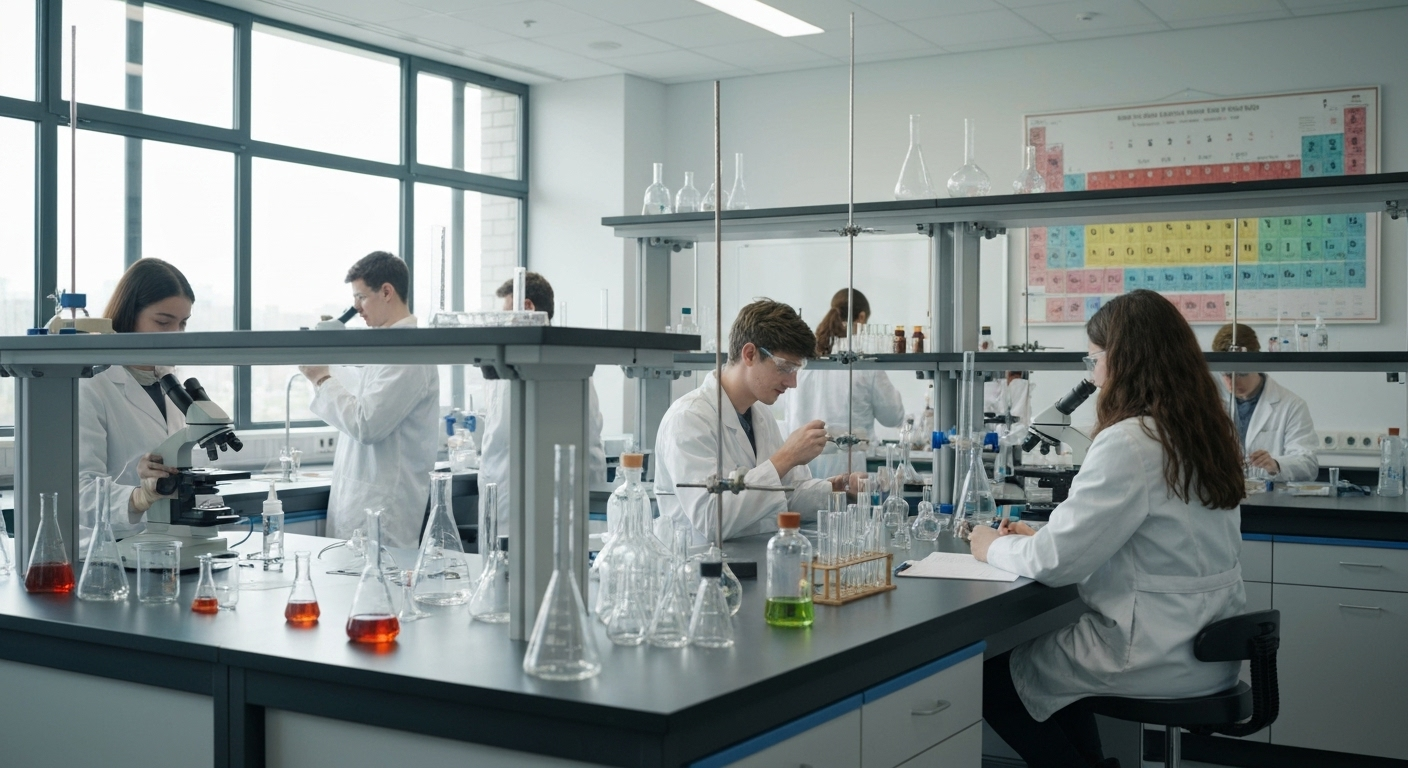Key Highlights of SCH4U Course
Here’s a look at why the SCH4U Chemistry course matters in your last year at high school:
- It is a Grade 12 university preparation course offered in the Ontario high school curriculum.
- The course covers five core units. These are organic chemistry, properties of matter, energy changes, rates of reaction, and electrochemistry.
- You will build investigation skills by taking part in hands-on and online labs.
- The course helps you learn about the importance of chemistry in your everyday life. You see how chemical processes work and what they do.
- This chemistry course is a needed prerequisite for many university programs. It is needed for science, engineering, and health science fields.
Introduction
Welcome to the world of Grade 12 Chemistry! Chemistry is a big part of daily life. It’s in the food you eat and the tech you use. When you know about it, you get to understand much about the world. The SCH4U course is the last science class for many high school students before university. This course lets you get more knowledge and also helps to build your thinking skills. It will get you ready for what comes next. It is made to challenge you and to help you see the real-life importance of chemistry and why it matters in our world.
SCH4U Course Outline: An Overview
The SCH4U chemistry course is a credit you need for your Ontario Secondary School Diploma (OSSD). This is a university-level course. It helps you build a strong understanding of chemistry. The course will go over the ideas you learned in Grade 11 and give you more detail.
This chemistry course is not only about reading from a textbook or listening to talks. You will work with the material through problem-solving and investigation. It will help you learn about the chemical processes that run our world. With this course, you will get ready for what comes next in your studies after high school.
What the SCH4U course covers
So, what will you learn in this course? SCH4U is divided into five key sections, each focused on a major area of advanced chemistry. The course helps you build a strong foundation for university studies in chemistry. You start with the structure and properties of matter, then progress to more complex topics, exploring both theoretical concepts and their real-world applications.
The main topics covered include:
- Organic Chemistry: Study carbon-based compounds essential to life.
- Structure and Properties of Matter: Examine molecular shapes and bonding.
- Energy Changes and Rates of Reaction: Learn about reaction speed and energy flow.
- Chemical Systems and Equilibrium: Analyze reversible reactions and balance.
- Electrochemistry: Explore chemical reactions and electricity.
Purpose of Grade 12 Chemistry in Ontario
Taking Grade 12 Chemistry in an Ontario high school is a smart step if you plan to pursue science after graduation. SCH4U prepares you for university by teaching key concepts needed for science, health, or engineering programs. The course does more than meet admission requirements it also helps you develop skills in critical thinking, data analysis, and scientific problem-solving. You learn to understand and apply scientific information, which supports informed decisions in daily life and future careers. Ultimately, SCH4U bridges the gap between high school and post-secondary science, encouraging you to use your knowledge in real-world scenarios. Many major university programs in Ontario require this course as a prerequisite, making it an important choice for your academic path.
Core Units in the SCH4U Course

The SCH4U course has five units that look at key parts of chemistry. You unpack each topic from the start to the end. This makes it simple to grow what you know bit by bit. You get to learn about the molecules of life and also how energy moves and powers things in our world.
The units each talk about special chemical processes and rules, like equilibrium in chemical systems and how energy flows. Here is what you’ll find in every one of these units.
Unit 1: Organic Chemistry
The first unit helps you get started with organic chemistry. Organic chemistry is the study of organic compounds, which are molecules with carbon in them. Some people might not know, but these compounds are behind all life found on Earth. Getting to know organic chemistry is key to understanding both biology and medicine.
In this unit, you will find out about different properties and reactions that organic compounds can have. There is also a big question here: Are organic compounds good for us? You will look at how the structure of these molecules can affect human health and what happens to the environment.
This unit sets up a strong base for you. It helps you see all the things and processes the people use every day. You can learn how this study of organic chemistry helps us look at things like plastics and medicine in a new way and helps us understand their impact in daily life.
Unit 2: Structure and Properties of Matter
How do the very small and unseen shapes of molecules affect the things we use every day? This unit about the structure and properties of matter will help you learn more. In it, you will get a better understanding of chemistry by looking at the parts of atoms, the way atoms join together, and the shapes that molecules take.
Knowing about this helps you guess how different chemicals will act. You will find out how the way molecules are built changes the physical and chemical properties of matter, like when something boils, if it can mix with water, or if it reacts with other things.
This unit does not just give you ideas but also shows how they work in real life. When you learn about how structure and actions are linked, you will notice how chemists create new materials with special properties for use in both technology and factories.
Unit 3: Energy Changes and Rates of Reaction
Energy is part of everything we do. In this unit, you will look at energy changes, rates of reaction, and how these things affect chemical processes. Energy changes and rates of reaction are important for your body’s processes and for things like car engines. You will also learn about thermochemistry. This area in chemistry is about how heat is made or taken in during chemical reactions.
One main topic is reaction kinetics. Here, you will study how fast reactions happen. You will also see how temperature, concentration, and catalysts can change the rates of reaction. Knowing this helps people control chemical processes in factories and many other areas.
The unit shows how these ideas are used in chemical technology and in taking care of our environment. Learning to manage energy changes and reaction rates is needed. This helps people make better and more earth-friendly technologies.
Unit 4: Chemical Systems and Equilibrium
Up to now, you might think that chemical reactions always move from reactants to products, and do not reverse. In this unit, you will see something new. The idea of equilibrium shows that many reactions can go forward and also go backward. Because of this, there is a moving balance all the time.
Learning about chemical systems and equilibrium helps you know more about important things in life and in industry. You will look at how pressure, temperature, and concentration can change this balance. The unit will help you build good investigation skills as you study these effects.
Equilibrium matters a lot in science and can have economic effects. It is important when you make fertilizers and other products, because it helps you get a higher amount of finished product. After you finish this unit, you will see chemical reactions in a new way.
Unit 5: Electrochemistry
Have you ever thought about how a battery gives power or why a car starts to rust? Both of these things are part of electrochemistry. This is the study of how chemical reactions are tied to electricity. At the heart of electrochemistry is how electrons move during chemical processes.
In this unit, you will learn about oxidation-reduction (REDOX) reactions. These reactions happen when electrons move from one thing to another. Many important technologies, like batteries, fuel cells, and ways to stop rust or add metal coatings, depend on these chemical processes. You will also find out how we can use electrochemistry to make better and greener batteries.
This unit will show you how chemistry connects to modern technology and how that affects our lives. Understanding electrochemistry is good for knowing about human health, too. It helps explain many things in the body, like how signals move along nerves using electrochemical signals.
Prerequisites and Eligibility for SCH4U
Are you eligible to enroll in the SCH4U course? As one of the advanced Ontario high school courses, it has a specific prerequisite to ensure you are prepared for the challenging material. Success in this course depends on having a solid understanding of foundational chemistry concepts.
The primary eligibility requirement is the successful completion of the Grade 11 University Preparation Chemistry course. This ensures you have the necessary background knowledge to tackle the advanced topics in Grade 12. Below is a simple table outlining the prerequisite.
Course Code | Course Name | Prerequisite |
|---|---|---|
SCH4U | Grade 12 Chemistry (University) | SCH3U, Grade 11 Chemistry (University) |
Assessment and Evaluation in the SCH4U Course
Your final grade in the SCH4U course is determined by various assessment methods aimed at enhancing your learning. Teachers provide feedback on your strengths and areas for improvement. Grades reflect how well your work meets course expectations. Throughout the course, assessments fall into four categories: Knowledge and Understanding, Critical Thinking, Communication, and Application.
Seventy percent of your final grade is based on semester work, including tests, assignments, and lab reports, focusing on your best results. The remaining thirty percent comes from a final evaluation, typically a culminating project and a final exam. A minimum of 50% is required to earn course credit.
Learning Outcomes of the SCH4U Course
By the end of the SCH4U course, you will know more about advanced chemistry. You will learn how to share scientific information in a clear and strong way.
You will also build your scientific investigation skills. In this course, you get to learn how to think like a scientist. You plan experiments, look at data, and make decisions based on proof. This helps you get ready for college or university.
Knowledge and concepts gained
The SCH4U course helps you get a deeper understanding of chemistry. You will learn more than basic ideas. In this course, you study topics like organic compounds and chemical equilibrium. This helps you see how the different parts of science connect with each other.
One big thing you take away from this course is how to handle and share scientific information. You will learn to use the right words for chemical processes. You also get to show your data and findings in a way that is clear and well-organized.
This broad understanding of chemistry is what universities want in students who want to study science. It helps make sure you are not just trying to remember facts. You really start to get the big ideas that rule the world of chemistry.
Scientific inquiry and lab skills developed
This course emphasizes developing your scientific inquiry and lab skills through hands-on experiments and virtual simulations. You will learn to ask meaningful questions, form hypotheses, and design investigations to test them. Online versions often include virtual labs and interactive animations, allowing you to safely explore chemical processes that may be too costly or dangerous in a physical setting. These activities help you collect data, analyze results, and communicate findings. By recording observations and sharing conclusions, you gain practical skills useful in science, engineering, or healthcare. Building these investigation skills is an essential part of your learning experience in SCH4U.
Preparation for university-level science programs
The SCH4U course prepares you for university by covering the chemistry needed for science, engineering, and health science programs. Universities expect students in these fields to have strong chemistry knowledge, and this course ensures you meet those expectations. Beyond chemistry, SCH4U helps you develop important skills like problem-solving, clear thinking, and data analysis. These abilities are valuable for any university program. Completing SCH4U also shows admissions officers that you are ready for the demands of university study, with strong academic habits and attention to detail. If you aim for competitive programs, this course will help you stand out.
Why the SCH4U Course Matters for University Pathways
Picking your Grade 12 classes is an important step in your university preparation. SCH4U is one course that you need to think about, especially if you plan to go into the STEM field. At USCA Academy, we emphasize that it’s more than just learning chemistry; it helps you get ready for new chances in school and in jobs later on.
Taking this course will help you meet the entry guidelines for many programs. It also helps you build skills that universities like and look for in students. One big part of SCH4U is the impact of chemical technology, which we explore at USCA Academy. This will help you understand more about how things work in the world, and be a smart and aware person in the future.
Admission requirements for science, health, and engineering
- SCH4U is a key requirement for many science, health, and engineering university programs in Ontario.
- Programs such as life sciences, biochemistry, chemical engineering, nursing, and pre-med often need Grade 12 Chemistry for admission.
- Without SCH4U, students may not qualify to apply for competitive STEM fields.
- Checking each university’s requirements before applying is essential; taking SCH4U keeps more options open and helps meet admission standards.
Transferable skills that benefit higher education
The SCH4U course offers more than periodic table facts it prepares you for university and real-world challenges. By tackling topics like organic chemistry and electrochemistry, you build skills useful in any subject or career. As you break down concepts and solve problems, you develop habits for lifelong learning and success in higher education.
Some main skills you get from SCH4U are:
- Problem-Solving: Working through complex problems with clear, step-by-step answers.
- Analytical Thinking: Looking at data, seeing patterns, and using facts to make decisions.
- Communication: Sharing hard science ideas in speaking and writing so others get them.
- Time Management: Managing your work, lab tasks, and study time, just like you will need at university.
Conclusion
The SCH4U course is important for those who want to study science in university. The course covers main ideas in chemistry. Learners will get better at understanding science and will also learn how to ask questions and do experiments. The lessons are made to match what universities want from students. Taking this course at USCA Academy helps learners get the knowledge they need to do well in college. Studying SCH4U can help with future learning and jobs. If you have questions or need help, you can get in touch.
Frequently Asked Questions
1. Is the SCH4U course suitable for students interested in non-science university programs?
This chemistry course is built for learners who want to study science. The skills you get here, like thinking things through and fixing problems, matter in any type of job or study. If you are taking online courses to finish your Ontario Secondary School Diploma, this will help you with your grades and make you look better to schools, no matter which program you pick in the end.
2. How does the SCH4U course help improve problem-solving skills in chemistry?
The course helps you get better at solving problems. It does this by pushing you to work on tough topics. The study of organic chemistry, equilibrium, and reaction rates needs you to think a lot and look for answers. When you learn investigation skills and ask questions like a scientist, you find ways to look at problems. You will see how to break things down, check all the parts, and think of good answers. This is what makes problem-solving work well.
3. What types of lab experiments are unique to the SCH4U course?
Many SCH4U courses, especially those found online, have virtual labs and simulations. You get to try out chemical processes that would be hard to do in a school lab. With this new way, you can learn lab skills in a safe and interactive way. The tools help you see how chemical processes work in everyday life before you take your final exam.
4. Does the SCH4U course focus on real-world applications of chemistry?
Yes, for sure. The course puts a big focus on showing the importance of chemistry in things you see and use in real life. You will see how it links to human health, the world around you, and the impact of chemical technology. This way, you get a better understanding of chemistry and how the ideas from the class connect to what happens every day.









